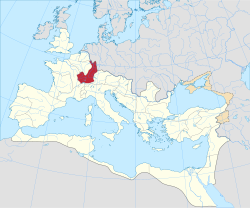Germania Superior
| Provincia Germania Superior | |||||
| Province of the Roman Empire | |||||
|
|||||
| The province of Germania Superior within the Roman Empire, c. 125 | |||||
| Capital | Mogontiacum | ||||
| Historical era | Antiquity | ||||
| • | Established after the Gallic wars | 83 | |||
| • | Gallic Empire | 260–274 | |||
| • | Frankish Empire | 475 | |||
| Today part of |
|
||||
Germania Superior ("Upper Germania") was a province of the Roman Empire. It comprised an area of western Switzerland, the French Jura and Alsace regions, and southwestern Germany. Important cities were Besançon (Besontio), Strasbourg (Argentoratum), Wiesbaden (Aquae Mattiacae), and Germania Superior's capital, Mainz (Mogontiacum). It comprised the Middle Rhine, bordering on the Limes Germanicus, and on the Alpine province of Raetia to the south-east. Although it had been occupied militarily since the reign of Augustus, Germania Superior (along with Germania Inferior) was not made into an official province until c. 85 AD.
The terms, "Upper Germania" and "Lower Germania" do not appear in the Gallic Wars of Julius Caesar, yet he writes about reports that the people who lived in those regions were referred to as Germani locally, a term used for a tribe that the Romans called the Germani Cisrhenani, and that the name Germania seems to have been adopted to designate other indigenous tribes in the area. Lower Germania was occupied by the Belgae. Upper Germania was occupied by Gaulish tribes including the Helvetii, Sequani, Leuci, and Treveri, and, on the north bank of the middle Rhine, the remnant of the Germanic troops that had attempted to take Vesontio under Ariovistus, but who were defeated by Caesar in 58 BC.
...
Wikipedia

